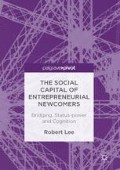Abstract
This chapter presents research findings from in-depth interview data in the form of narrative analysis and illustrative quotations. The data demonstrates how technical-professional entrepreneurial newcomers in the pursuit of high-potential start-up converge with influential and powerful bridges and align their communication styles to blend in. In particular, the data shows that technical-professional entrepreneurial newcomers attune their cognition and cognitively converge with influential and powerful bridges through in-group approximation, formal-functional language and concise-accurate communication.
Access this chapter
Tax calculation will be finalised at checkout
Purchases are for personal use only
References
Apker, J., Propp, K., & Ford, W. S. (2005). Negotiating status and identity tensions in healthcare team interactions: An exploration of nurse role dialectics. Journal of Applied Communication Research, 33, 93–115.
Ayoko, O. B., Hartel, C. E. J., & Callan, V. J. (2002). Resolving the puzzle of productive and destructive conflict in culturally heterogeneous workgroups: A communication accommodation theory approach. International Journal of Conflict Management, 13, 165–195.
Castells, M. (2009). Communication power. Oxford/New York: Oxford University Press.
DeFillippi, R. J., Arthur, M. B., & Lindsay, V. J. (2006). Knowledge at work – Creative collaboration in the global economy. MA and Oxford: Blackwell.
Emirbayer, M., & Goodwin, J. (1994). Network analysis, culture, and the problem of agency. American Journal of Sociology, 99, 1411–1454.
Giddens, A. (1991). Modernity and self-identity. Cambridge: Polity Press.
Giles, H., Coupland, J., & Coupland, N. (1991). Accommodation theory: Communication contexts and consequence. In H. Giles, N. Coupland, & J. Coupland (eds.), Contexts of accommodation: Developments in applied sociolinguistics. Cambridge: Cambridge University Press.
McCann, R. M., & Giles, H. (2006). Communication with people of different ages in the workplace: Thai and American data. Human Communication Research, 32, 74–108.
Willemyns, M., Gallois, C., & Callan, V. J. (2003). Trust me, I’m your boss: Trust and power in supervisor-supervisee communication. International Journal of Human Resource Management, 14, 117–127.
Author information
Authors and Affiliations
Copyright information
© 2017 The Author(s)
About this chapter
Cite this chapter
Lee, R. (2017). Entrepreneurial Newcomers and Cognitive Convergence in Bridging Structures. In: The Social Capital of Entrepreneurial Newcomers. Palgrave Macmillan, London. https://doi.org/10.1057/978-1-137-59820-2_6
Download citation
DOI: https://doi.org/10.1057/978-1-137-59820-2_6
Published:
Publisher Name: Palgrave Macmillan, London
Print ISBN: 978-1-137-59819-6
Online ISBN: 978-1-137-59820-2
eBook Packages: Business and ManagementBusiness and Management (R0)

